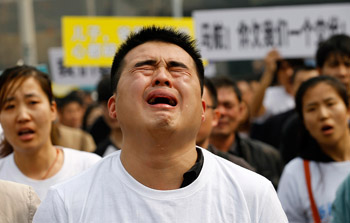 Kuala Lumpur, Apr 20: The grieving families of the 239 passengers and crew of Flight MH370 will receive financial assistance from Malaysia Airlines to ease their burdens, a top official said today, 44 days after the plane vanished mysteriously from radar screens.
Kuala Lumpur, Apr 20: The grieving families of the 239 passengers and crew of Flight MH370 will receive financial assistance from Malaysia Airlines to ease their burdens, a top official said today, 44 days after the plane vanished mysteriously from radar screens.
Deputy Foreign Minister Hamzah Zainuddin, who heads the sub-committee focusing on the next-of-kin of people on board the ill-fated plane, said that the process to identify those who would receive the assistance started two weeks ago.
The assistance would come solely from Malaysia Airlines (MAS), with the Government only stepping in to bear some of the costs if there is a need for it, he said.
Malaysia has been criticised for its handling of the tragedy, particularly by the relatives of the 154 Chinese passengers on board the ill-fated plane, besides being accused of hiding information.
During a briefing with the families, Hamzah said the families have been requested to submit their own amounts for financial assistance.
"Some of the families have lost their breadwinners and may be facing financial difficulties."Those affected will all receive some form of financial assistance from MAS. However, when the assistance will be given will be determined at a later date as we have recipients from 15 different countries," he was quoted as saying by the Star.com.
He added that two Malaysian representatives were in talks with the families in China regarding financial assistance, with MCA vice-president Paduka Chew Mei Fun expected to fly to Beijing to speak to the next-of-kin of Chinese passengers as well.
Beijing-bound Flight MH370, with 239 people aboard, including five Indians, left the Kuala Lumpur International Airport at 12.41 am on March 8 and disappeared from radar screens about an hour later while over the South China Sea.
A multinational search was mounted for the Boeing 777-200 aircraft, first in the South China Sea and then, after it was learnt that the plane had veered off course, in the southern Indian Ocean.
After an analysis of satellite data indicated that the plane's last position was in the middle of the Indian Ocean, west of Perth, Australia, Malaysian Prime Minister Najib Razak announced on March 24 that Flight MH370 had "ended in the southern Indian Ocean".
A multi-nation search operation led by Australia during the last 44 days have been scouring the Indian Ocean but has failed to find the crucial black boxes or the debris of the plane.




Comments
Add new comment